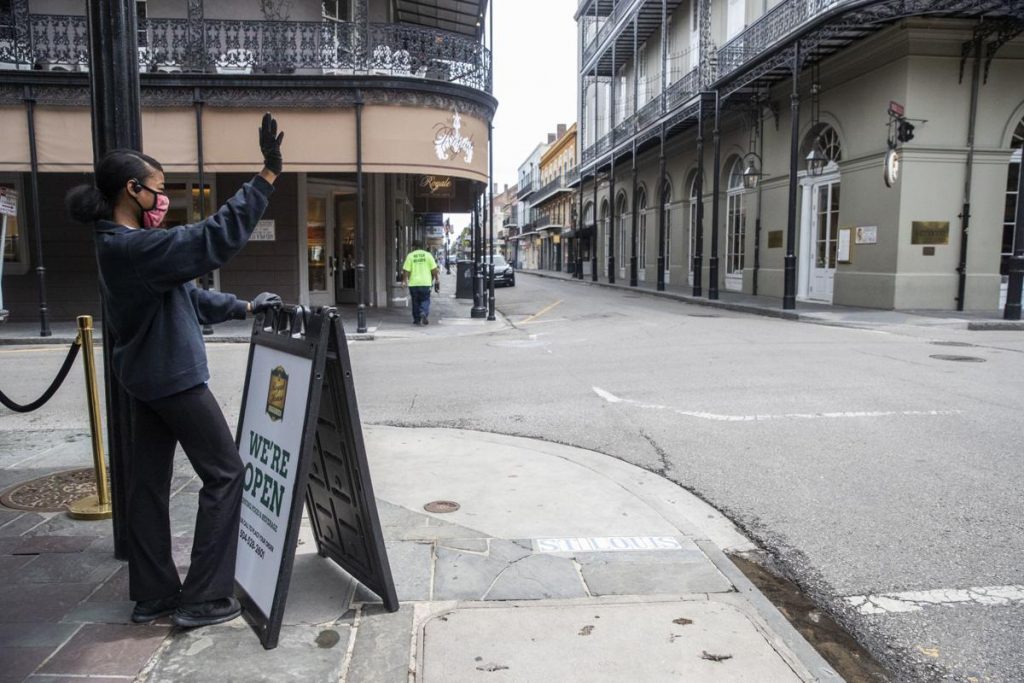How can New Orleans bring back visitors after coronavirus? By reinventing itself, leaders say

New Orleans’ ailing jobs market, heavily dependent on tourism, can rebound in the coming months only if officials convince the nation that the city has beaten back coronavirus and is open for business, economic development leaders said Wednesday.
The effort will require trumpeting the city’s success in suppressing the disease, convincing residents and businesses to keep taking precautions and coming up with creative ways to stop the bleeding for businesses that have laid off workers or closed entirely.
The city also needs to bring back tourism while also doing better at attracting new types of industries, such as manufacturing and technology, GNO Inc. and New Orleans Business Alliance officials told City Council members on Wednesday.
“For a lot of people, the last time they really heard about New Orleans in the context of COVID-19 was that we were a hotspot,” said Quentin Messer, head of the New Orleans Business Alliance, the city’s economic development agency. “Well, we are no longer a hotspot.”
Officials are tasked with reviving an economy that has seen tens of thousands of workers file for unemployment since the March shutdowns aimed at slowing the spread of the disease. Weekly unemployment claims have improved a bit since their peak in March as many businesses have begun to reopen.
In 2019, nearly 20 million visitors came to New Orleans for festivals, vacations, weddings and other trips. And while tourists flocked to the city for Carnival, that all changed in March when the first cases of coronavirus cases were reported in the city.
Since then, New Orleans has been almost completely barren of tourists. Conventions have been canceled and the flow of passengers through Louis Armstrong New Orleans International Airport is down to a trickle. City Hall officials are expecting a $170 million hit to the budget due to the falloff in sales tax revenues.
Citing the strict lockdown rules, 13 New Orleans-area hotels told the Louisiana Workforce Commission that more than 2,300 of their furloughed workers would stay jobless through the end of the year, according to data posted Wednesday. Among the largest, with job losses of more than 400 each, were the Sheraton, the New Orleans Marriott Hotel, and the Ritz-Carlton, all on Canal Street.
Their workers won’t be able to access a $600 federal unemployment boost after July 31, leaving them to rely on an average $216 state payout that one liberal think tank recently ranked as one of the lowest in the nation.
And after an eviction ban ends on June 15, many landlords will be under no obligation to continue to house tenants who can’t afford rent payments.
All of that creates severe challenges for New Orleans, which plans on Saturday to enter a second phase of eased restrictions that will see bars, spas and casinos open for the first time in months and restaurants and retail stores offer services to more customers.
Mayor LaToya Cantrell has already begun spreading that message in national interviews. Last month, tourism-marketing agency New Orleans & Co. said it is embarking on a marketing plan aimed at bringing in visitors from nearby who might be looking for a weekend trip even if they aren’t yet willing to get on a plane.
Getting the word out about New Orleans’ continued declines in cases, robust testing and cautious approach to reopening its economy will be needed to convince tourists choose the city over other destinations, said Messer, and bringing them in is critical to keeping restaurants and other businesses alive.
Messer noted that 60% of the people who dine out in the city are tourists, a sign that New Orleanians can’t keep anything close to all of the city’s restaurants afloat by themselves.
NOLABA has also worked to stem losses while the tourism has lagged, raising $1.3 million in relief funds for gig and hospitality workers, small business owners and others. Cantrell also secured $18 million from FEMA to run a mass feeding program that is expected to begin in the coming weeks.
The city must also prepare for the coronavirus’ effect on other businesses that were struggling before the pandemic and that have closed permanently in its wake, closures that could disrupt neighborhoods already hanging in the balance, said NOLABA Chief Engagement and Solutions Officer Nolan Marshall III.
Instead of allowing abandoned storefronts in struggling neighborhoods to stay empty, “can we put distribution in some of those buildings? Can we put ‘ghost kitchens’ in some of those buildings, if we know the restaurant industry is going to work very differently?” Marshall said.
Such a kitchen could house various restaurants that work with a food delivery service to serve dinner to patrons, he said.
Marshall said the Lower 9th Ward is one such neighborhood. CVS Pharmacy, widely heralded when it came to the Lower 9 in 2016 as a boost for that area, is closing its North Claiborne Avenue store permanently on June 14, a CVS Corporate spokesman confirmed Wednesday.
New Orleans should also diversify its job market by attracting companies who will be seeking to switch up their strategies after coronavirus, GNO CEO Michael Hecht added. That includes manufacturing companies who may not wish to be so dependent on China for their supply chain, after the global lockdown recently highlighted America’s overreliance on Chinese manufacturing.
It also includes technology companies looking to hire domestic workers and food manufacturing companies looking for swift transport such as what is found on Mississippi River, rail lines and the region’s highway system. That can be done if the city promotes itself as safe, and makes other longer term investments to ensure workers are trained for those jobs, Hecht said.
“The good news is that the whole world loves New Orleans,” Hecht said. “People want to see us win. We just have to come in and corrobate those wishes with stories of our resilience, and frankly, our success in flattening the curve as well as anywhere in the country.”